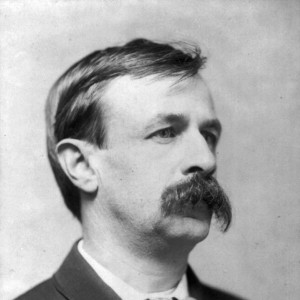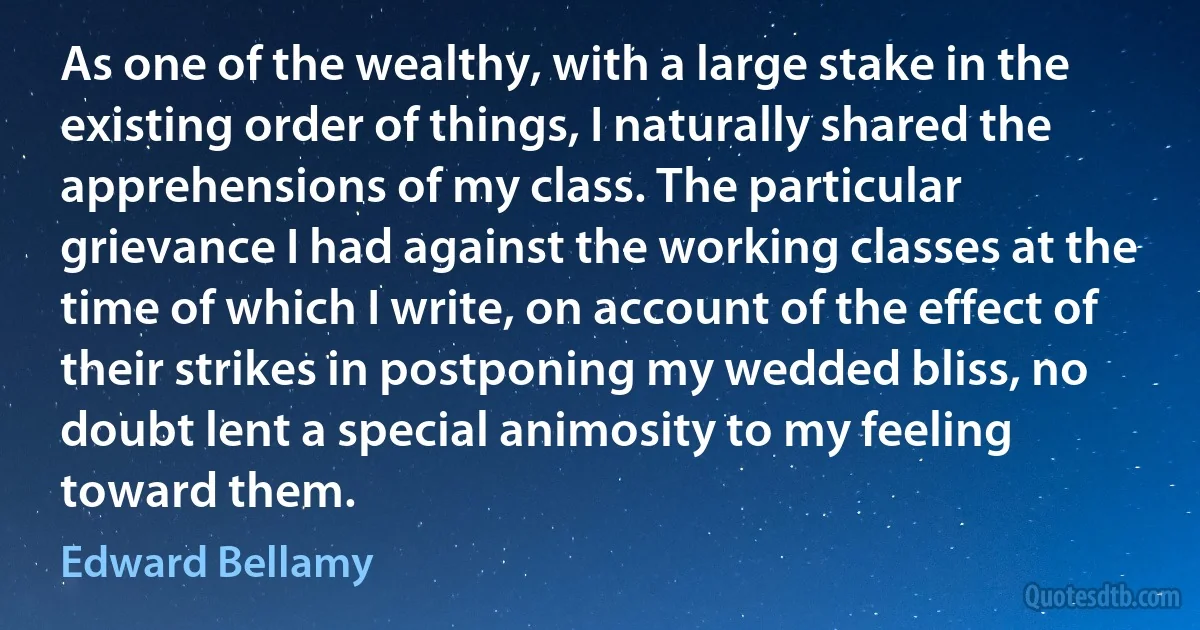Edward Bellamy quotes - page 2
Edward Bellamy was an American author and journalist, most famous for his utopian novel "Looking Backward." His visionary work imagined a future society based on equality and social reform. He inspired numerous political and social movements advocating for economic fairness and cooperation. Here are 72 of his quotes:
My friends, if you would see men again the beasts of prey they seemed in the nineteenth century, all you have to do is to restore the old social and industrial system, which taught them to view their natural prey in their fellow-men, and find their gain in the loss of others. No doubt it seems to you that no necessity, however dire, would have tempted you to subsist on what superior skill or strength enabled you to wrest from others equally needy.

Edward Bellamy
Their system of unorganized and antagonistic industries was as absurd economically as it was morally abominable. Selfishness was their only science, and in industrial production selfishness is suicide. Competition, which is the instinct of selfishness, is another word for dissipation of energy, while combination is the secret of efficient production; and not till the idea of increasing the individual hoard gives place to the idea of increasing the common stock can industrial combination be realized, and the acquisition of wealth really begin. Even if the principle of share and share alike for all men were not the only humane and rational basis for a society, we should still enforce it as economically expedient, seeing that until the disintegrating influence of self-seeking is suppressed no true concert of industry is possible.

Edward Bellamy
To educate some to the highest degree, and leave the mass wholly uncultivated, as you did, made the gap between them almost like that between different natural species, which have no means of communication. What could be more inhuman than this consequence of a partial enjoyment of education!

Edward Bellamy
The actual expense of your colleges appears to have been very low, and would have been far lower if their patronage had been greater. The higher education nowadays is as cheap as the lower, as all grades of teachers, like all other workers, receive the same support. We have simply added to the common school system of compulsory education, in vogue in Massachusetts a hundred years ago, a half dozen higher grades, carrying the youth to the age of twenty-one and giving him what you used to call the education of a gentleman, instead of turning him loose at fourteen or fifteen with no mental equipment beyond reading, writing, and the multiplication table.

Edward Bellamy
If it took half the revenue of the nation, nobody would grudge it, nor even if it took it all save a bare pittance. But in truth the expense of educating ten thousand youth is not ten nor five times that of educating one thousand. The principle which makes all operations on a large scale proportionally cheaper than on a small scale holds as to education also.

Edward Bellamy
You will see...many very important differences between our methods of education and yours, but the main difference is that nowadays all persons equally have those opportunities of higher education which in your day only an infinitesimal portion of the population enjoyed. We should think we had gained nothing worth speaking of, in equalizing the physical comfort of men, without this educational equality....

Edward Bellamy
Whatever her sorrow had once been, for nearly a century she had ceased to weep, and, my sudden passion spent, my own tears dried away. I had loved her very dearly in my other life, but it was a hundred years ago! I do not know but some may find in this confession evidence of lack of feeling, but I think, perhaps, that none can have had an experience sufficiently like mine to enable them to judge me.

Edward Bellamy
There is neither private property, beyond personal belongings, now, nor buying and selling, and therefore the occasion of nearly all the legislation formerly necessary has passed away. Formerly, society was a pyramid poised on its apex. All the gravitations of human nature were constantly tending to topple it over, and it could be maintained upright, or rather upwrong (if you will pardon the feeble witticism), by an elaborate system of constantly renewed props and buttresses and guy-ropes in the form of laws. A central Congress and forty state legislatures, turning out some twenty thousand laws a year, could not make new props fast enough to take the place of those which were constantly breaking down or becoming ineffectual through some shifting of the strain. Now society rests on its base, and is in as little need of artificial supports as the everlasting hills.

Edward Bellamy
In your day fully nineteen twentieths of the crime, using the word broadly to include all sorts of misdemeanors, resulted from the inequality in the possessions of individuals; want tempted the poor, lust of greater gains, or the desire to preserve former gains, tempted the well-to-do. Directly or indirectly, the desire for money, which then meant every good thing, was the motive of all this crime, the taproot of a vast poison growth, which the machinery of law, courts, and police could barely prevent from choking your civilization outright.

Edward Bellamy
We leave the question whether a man shall be a brain or hand worker entirely to him to settle. At the end of the term of three years as a common laborer, which every man must serve, it is for him to choose, in accordance to his natural tastes, whether he will fit himself for an art or profession, or be a farmer or mechanic. If he feels that he can do better work with his brains than his muscles, he finds every facility provided for testing the reality of his supposed bent, of cultivating it, and if fit of pursuing it as his avocation. The schools of technology, of medicine, of art, of music, of histrionics, and of higher liberal learning are always open to aspirants without condition.

Edward Bellamy
The organization of society with you was such that officials were under a constant temptation to misuse their power for the private profit of themselves or others. Under such circumstances it seems almost strange that you dared entrust them with any of your affairs. Nowadays, on the contrary, society is so constituted that there is absolutely no way in which an official, however ill-disposed, could possibly make any profit for himself or any one else by a misuse of his power. Let him be as bad an official as you please, he cannot be a corrupt one. There is no motive to be. The social system no longer offers a premium on dishonesty.

Edward Bellamy
The industry and commerce of the country, ceasing to be conducted by a set of irresponsible corporations and syndicates of private persons at their caprice and for their profit, were entrusted to a single syndicate representing the people, to be conducted in the common interest for the common profit. The nation, that is to say, organized as the one great business corporation in which all other corporations were absorbed; it became the one capitalist in the place of all other capitalists, the sole employer, the final monopoly in which all previous and lesser monopolies were swallowed up, a monopoly in the profits and economies of which all citizens shared.

Edward Bellamy
The cities of that period were rather shabby affairs. If you had the taste to make them splendid, which I would not be so rude as to question, the general poverty resulting from your extraordinary industrial system would not have given you the means. Moreover, the excessive individualism which then prevailed was inconsistent with much public spirit. What little wealth you had seems almost wholly to have been lavished in private luxury. Nowadays, on the contrary, there is no destination of the surplus wealth so popular as the adornment of the city, which all enjoy in equal degree.

Edward Bellamy
The nervous tension of the public mind could not have been more strikingly illustrated than it was by the alarm resulting from the talk of a small band of men who called themselves anarchists, and proposed to terrify the American people into adopting their ideas by threats of violence, as if a mighty nation which had but just put down a rebellion of half its own numbers, in order to maintain its political system, were likely to adopt a new social system out of fear.

Edward Bellamy
What we did see was that industrially the country was in a very queer way. The relation between the workingman and the employer, between labor and capital, appeared in some unaccountable manner to have become dislocated. The working classes had quite suddenly and very generally become infected with a profound discontent with their condition, and an idea that it could be greatly bettered if they only knew how to go about it. On every side, with one accord, they preferred demands for higher pay, shorter hours, better dwellings, better educational advantages, and a share in the refinements and luxuries of life, demands which it was impossible to see the way to granting unless the world were to become a great deal richer than it then was.

Edward Bellamy
In the first place, it was firmly and sincerely believed that there was no other way in which Society could get along, except the many pulled at the rope and the few rode, and not only this, but that no very radical improvement even was possible, either in the harness, the coach, the roadway, or the distribution of the toil. It had always been as it was, and it always would be so. It was a pity, but it could not be helped, and philosophy forbade wasting compassion on what was beyond remedy.

Edward Bellamy
As political equality is the remedy for political tyranny, so is economic equality the only way of putting an end to the economic tyranny exercised by the few over the many through superiority of wealth. The industrial system of a nation, like its political system, should be a government of the people, by the people, for the people. Until economic equality shall give a basis to political equality, the latter is but a sham.

Edward Bellamy
Edward Bellamy
 Occupation: American Author
Occupation: American Author
Born: March 26, 1850
Died: May 22, 1898
Quotes count: 72
Wikipedia: Edward Bellamy













